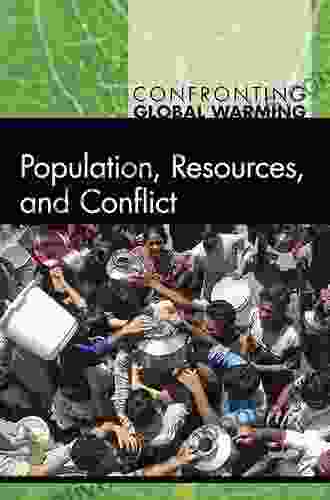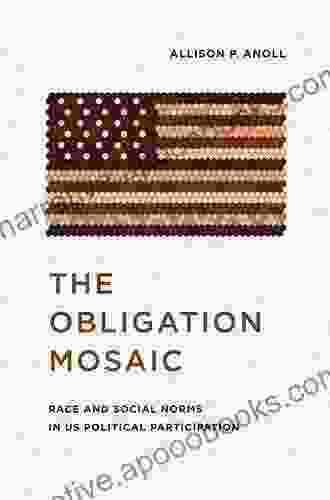Race and Social Norms in US Political Participation: A Comprehensive Examination

Political participation, a cornerstone of any functioning democracy, has been a subject of continuous scrutiny and research. The factors influencing individuals' engagement in political activities are multifaceted, ranging from socio-economic variables to psychological traits. Among these factors, race and ethnicity, along with their intricate interplay with social norms, play a significant role in shaping political participation in the United States.
This comprehensive article delves into the complex relationship between race, social norms, and political participation in the United States, drawing insights from the groundbreaking work presented in the acclaimed book "Race and Social Norms in US Political Participation: Chicago Studies in American Politics."
4.5 out of 5
| Language | : | English |
| File size | : | 3788 KB |
| Text-to-Speech | : | Enabled |
| Screen Reader | : | Supported |
| Enhanced typesetting | : | Enabled |
| Word Wise | : | Enabled |
| Print length | : | 264 pages |
| Lending | : | Enabled |
The Interplay of Race and Social Norms
Race, a socially constructed category, profoundly influences individuals' experiences, opportunities, and interactions within society. Social norms, on the other hand, are unwritten rules and expectations that govern behavior within a group or community. The intersection of race and social norms gives rise to unique dynamics that impact political participation.
Research suggests that racial minorities face distinct barriers to political participation compared to their white counterparts. These obstacles stem from historical and ongoing discrimination, economic disparities, and social exclusion. Social norms within minority communities may also discourage political engagement due to fears of reprisal, social isolation, or a lack of perceived efficacy.
Conversely, positive social norms within minority communities can foster political participation. For instance, norms emphasizing civic responsibility, collective action, and the importance of political representation can encourage individuals to overcome barriers and engage in the political process.
Types of Political Participation
Political participation encompasses a wide range of activities, including voting, running for office, attending political rallies, donating to campaigns, and contacting elected officials. The type of participation individuals engage in can vary based on their race and the social norms within their community.
For example, research has shown that Black Americans are more likely to participate in protest movements and community organizing compared to white Americans. This can be attributed to a shared sense of racial identity, a history of collective action, and social norms that value speaking out against injustice.
The Role of Social Capital
Social capital, defined as the resources and connections available to individuals within a community, plays a crucial role in political participation. Racial minorities often have lower levels of social capital due to historical and ongoing discrimination, which can limit their access to information, mobilize support, and influence political outcomes.
However, social capital can also be a source of empowerment for minority communities. Strong social networks, community-based organizations, and institutions can provide individuals with the support, resources, and encouragement necessary to overcome barriers and participate in the political process.
The Impact of Voter Suppression
Voter suppression efforts have a disproportionate impact on racial minorities, further hindering their political participation. These tactics, which include restrictive voter ID laws, purges of voter rolls, and limited polling locations, create significant barriers for minority voters.
Social norms that perpetuate negative stereotypes about minority voters, such as the belief that they are more likely to commit voter fraud, can also contribute to voter suppression. These norms create a climate of fear and distrust that discourages minority participation in the electoral process.
Strategies for Increasing Minority Political Participation
Overcoming the barriers to minority political participation requires a multifaceted approach that addresses both individual and systemic factors. Strategies for increasing minority participation include:
* Expanding access to voting: Eliminating restrictive voter ID laws, implementing automatic voter registration, and providing accessible polling locations. * Combating voter suppression: Enacting laws to protect minority voters from intimidation and discrimination. * Promoting civic education: Increasing awareness of the importance of political participation and providing resources to minority communities. * Building social capital: Investing in community-based organizations and institutions that provide support and resources to minority communities. * Challenging negative stereotypes: Countering harmful narratives about minority voters and promoting a more inclusive political discourse.
The relationship between race, social norms, and political participation in the United States is complex and multifaceted. Racial minorities face unique barriers to participation, but social norms within their communities can both hinder and facilitate their engagement in the political process. Understanding the intricate interplay between these factors is essential for developing effective strategies to increase minority political participation and ensure a more representative and inclusive democracy.
"Race and Social Norms in US Political Participation: Chicago Studies in American Politics" provides a comprehensive exploration of this crucial topic, offering valuable insights and practical recommendations for promoting political equality and empowering all citizens to participate in the shaping of their society.
4.5 out of 5
| Language | : | English |
| File size | : | 3788 KB |
| Text-to-Speech | : | Enabled |
| Screen Reader | : | Supported |
| Enhanced typesetting | : | Enabled |
| Word Wise | : | Enabled |
| Print length | : | 264 pages |
| Lending | : | Enabled |
Do you want to contribute by writing guest posts on this blog?
Please contact us and send us a resume of previous articles that you have written.
 Book
Book Novel
Novel Page
Page Chapter
Chapter Text
Text Story
Story Genre
Genre Reader
Reader Library
Library Paperback
Paperback E-book
E-book Magazine
Magazine Newspaper
Newspaper Paragraph
Paragraph Sentence
Sentence Bookmark
Bookmark Shelf
Shelf Glossary
Glossary Bibliography
Bibliography Foreword
Foreword Preface
Preface Synopsis
Synopsis Annotation
Annotation Footnote
Footnote Manuscript
Manuscript Scroll
Scroll Codex
Codex Tome
Tome Bestseller
Bestseller Classics
Classics Library card
Library card Narrative
Narrative Biography
Biography Autobiography
Autobiography Memoir
Memoir Reference
Reference Encyclopedia
Encyclopedia Diane Rose Solomon
Diane Rose Solomon Allan Stevo
Allan Stevo Michael Ashby
Michael Ashby All On The Board
All On The Board Wil Wheaton
Wil Wheaton Nicole Snow
Nicole Snow Alison Pick
Alison Pick Julio Ramos
Julio Ramos Larry Frazier
Larry Frazier Alice Renner Rigney
Alice Renner Rigney Penny Parsons
Penny Parsons Roland Merullo
Roland Merullo Gess Leblanc
Gess Leblanc Brenda Davies
Brenda Davies Alix Rickloff
Alix Rickloff Iain Mclean
Iain Mclean Aline Mello
Aline Mello Marc Cameron
Marc Cameron Mariah Stewart
Mariah Stewart Tyrone L Waller
Tyrone L Waller
Light bulbAdvertise smarter! Our strategic ad space ensures maximum exposure. Reserve your spot today!

 Gabriel BlairDefying Danger: The Heart-Pounding Journey in "Fighting for Charlotte: Heroes...
Gabriel BlairDefying Danger: The Heart-Pounding Journey in "Fighting for Charlotte: Heroes...
 James HayesTian Han and the Intersection of Performance and Politics: A Journey Through...
James HayesTian Han and the Intersection of Performance and Politics: A Journey Through...
 Aleksandr PushkinSword Art Online 24 Light Novel Unital Ring III: A Dive into the Uncharted...
Aleksandr PushkinSword Art Online 24 Light Novel Unital Ring III: A Dive into the Uncharted...
 F. Scott FitzgeraldStep into the Enchanting World of Creeping Beautiful by Ja Huss: A Literary...
F. Scott FitzgeraldStep into the Enchanting World of Creeping Beautiful by Ja Huss: A Literary... Forrest BlairFollow ·6.7k
Forrest BlairFollow ·6.7k Heath PowellFollow ·13.3k
Heath PowellFollow ·13.3k Quentin PowellFollow ·3.4k
Quentin PowellFollow ·3.4k Bernard PowellFollow ·7.1k
Bernard PowellFollow ·7.1k Elliott CarterFollow ·5.4k
Elliott CarterFollow ·5.4k Desmond FosterFollow ·10.5k
Desmond FosterFollow ·10.5k Ernest HemingwayFollow ·13k
Ernest HemingwayFollow ·13k Andy HayesFollow ·2.2k
Andy HayesFollow ·2.2k

 F. Scott Fitzgerald
F. Scott FitzgeraldUnravel the Enigmatic Murder of Mary Russell: A...
Prologue: A Grisly Discovery In the...

 Connor Mitchell
Connor MitchellLittle Quilts: Gifts from Jelly Roll Scraps
Embrace the Art...

 Harold Powell
Harold PowellPoverty Survival Hope In An American City: A Pulitzer...
A testament to the resilience of the human...

 Ray Blair
Ray BlairConfronting Global Warming: Population, Resources, and...
Global warming is one of the most pressing...

 Gary Cox
Gary CoxStyle Your Most Authentic Self and Cultivate a Mindful...
Unlock Your True...

 Caleb Long
Caleb LongEmbark on a Colorful Patchwork Adventure: Discover 20 To...
Step into the captivating world of...
4.5 out of 5
| Language | : | English |
| File size | : | 3788 KB |
| Text-to-Speech | : | Enabled |
| Screen Reader | : | Supported |
| Enhanced typesetting | : | Enabled |
| Word Wise | : | Enabled |
| Print length | : | 264 pages |
| Lending | : | Enabled |




